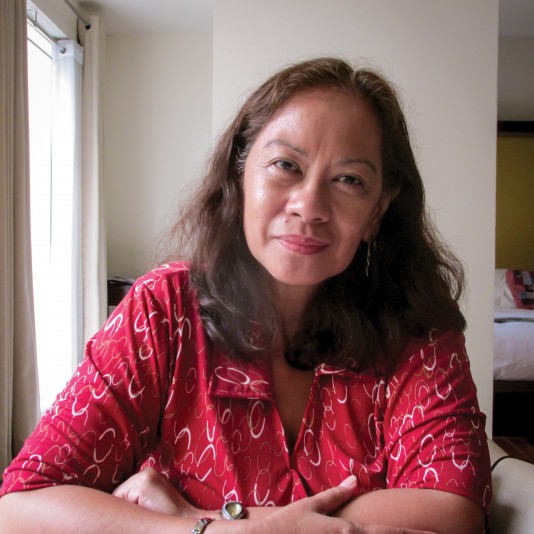
Twenty years ago, when she was 36 years old, Maria Esperanza “Pitts” Muyot-Liamco never imagined the role she is playing today – working for the Armed Forces of the Philippines, where she is a passionate advocate of peace education.
Muyot-Liamco majored in statistics at college and then worked in information technology for 20 years, including 14 years doing systems analysis and programming in Bahrain.
Family matters brought her back to the Philippines – her son and daughter to raise, mother with cancer to care for.
In 2011 came an unexpected invitation. The Armed Forces of the Philippines decided to open a Peace Process Office. The officer selected to head the initiative knew Muyot-Liamco and her ability to grapple with data.
Today Muyot-Liamco is the lead researcher within the 20-person Peace Process Office. The office consists of five officers and 11 enlisted members of the armed forces, plus four civilian researchers headed by Muyot-Liamco. The career military personnel get reassigned or promoted on a regular basis. As a result, Muyot-Liamco is the only person who has worked in the office from the beginning.
The office has no enforcement power. Its power lies in encouraging peace-supportive policies. It works closely with the Office of the Presidential Adviser on the Peace Process, the government agency that oversees the comprehensive peace process with the rebel groups.
When Muyot-Liamco realized the influential role the Peace Process Office could play, she also realized that personnel within the office would benefit from being trained in the field of peacebuilding.
Upon learning of courses offered by the Mindanao Peacebuilding Institute, she took MPI classes covering: (1) the fundamentals of nonviolence; (2) resource-based conflict; and (3) indigenous ways of resolving conflict, centering around field meetings with elders and other local leaders.*
The MPI experience was transformative for Muyot-Liamco. In that first session of MPI, followed by another round of MPI coursework in 2014, Muyot-Liamco found herself in classes with people struggling day-to-day with addressing violence in the Philippines, plus peace-motivated people from across Asia – China, South Korea, Japan, Bangladesh, Indonesia, Myanmar, Nepal, India, Cambodia and Laos. She even met a security officer from Nigeria.
“Aside from the formal education, I received a cultural education,” says Muyot-Liamco. “It was nice to live together and share our experiences with each other. I really appreciated the after-dinner conversations. The multi-national context allowed us to learn a lot from each other. I still maintain ties with some of my classmates.”
From her research prior to attending MPI, Muyot-Liamco understood that conflict in the southern Philippines was “rooted in economic underdevelopment, discrimination, and identity issues.” But MPI helped her to bring that understanding down to the level of the human beings struggling with these issues, and to see how relationship-building can sow seeds for peace.
Muyot-Liamco, who is Christian, especially valued the MPI field trips – such as one where she sat in “an open-air hut,” talking with people like the Muslim principal of an elementary school who spoke of incorporating peace principles into the school’s math, English and health curriculum. Local officials spoke of setting up committees “to look after the interests of all” that included representatives of all groups in conflict with each other. Village elders spoke of ceremonies of reconciliation, tapping indigenous traditions.
In mid-2014, the Peace Process Office in Manila invited an MPI instructor to Manila to hold an educational session for the entire group, focusing on the impact of violence and resulting trauma on people, including military personnel.
“This was the first time that something like this had happened in our office,” said Muyot-Liamco. Half-day lectures by the Peace Process Office are now included in the trainings for officer candidates and intelligence officers in the Armed Forces.
* MPI was founded in 2000 by people who had done coursework at EMU’s Summer Peacebuilding Institute and was explicitly modeled after SPI, as described in the accompanying feature article.